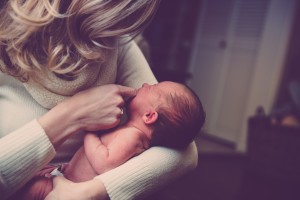By Brigitte Linder, Chinese Medicine Practitioner, Safflower Chinese Medicine Clinic & Safflower Chinese Medicine Dispensary
 As a Chinese medicine practitioner, I have always been intrigued by the idea of staying at home for at least a month after giving birth. Straight after giving birth, a woman is at her most vulnerable.
As a Chinese medicine practitioner, I have always been intrigued by the idea of staying at home for at least a month after giving birth. Straight after giving birth, a woman is at her most vulnerable.
In China, this tradition is called “sitting in with your child” (zuo yue zi 坐月子). This period of confinement lasts for 30 days after the baby is born. The Chinese strongly believe that during this time, a new mother requires good rest, nourishing food and minimal disruption so that her body and mind adjusts to her new situation.
Throughout this month, a new mother requires special care, follows certain requirements, observes specific taboos and she doesn’t leave the house. She needs to focus on nursing and establishing a beautiful bond with her baby.
I remember when Ann, one of my acupuncture teachers, had just given birth to her first boy. A couple of close friends and I visited her after the crucial period of 30 days had passed and Ann had recovered from the birth. She had been “sitting in with her child” for that first month of his life. Her parents were on home duties making sure that she had nutritious meals, stayed warm and protected and was able to intimately bond with her child. Only close family were allowed to visit so that both mum and bub would not be exposed to frenetic energy, viruses or bacteria.
I think sitting in with your child is a wonderful tradition and such a nurturing and grounding experience for new mothers. In fact, the whole family can benefit from it. If manageable and affordable for the family, I highly recommend it.
- The mother can rest whilst the baby sleeps, which should be a lot.
- She’s most comfortable and safe at home.
- She’s able to establish that bond with her child that will set the tone for a lifetime.
- The mother is less exposed to possible risks that lurk in the outside world: catching a cold (viruses, bacteria), developing allergies (whilst the immune system is low), and being exposed to ‘bad’ air, water or gases.
- Baby is also protected from outside germs and toxins.
- Nutritious food can be freshly prepared.
When a child is conceived, to grow and develop in the uterus for 40 weeks it requires energy and blood (physical components for a child to grow). Where does this energy come from? Mainly from the mother as the unborn has already received his or her “heavenly Qi” on conception. Heavenly Qi is something very subtle, delicate and fine.
After giving birth, the vital substances of Qi (energy) and Blood (in the Chinese medicine sense) are severely depleted in the new mother – otherwise how can a baby grow? Baby is entirely dependent on mother’s body to grow and develop (energy and blood = body tissue).
Acquired (post-birth) Qi comes through breastmilk from the mother and oxygen from the atmosphere during the first 9 months. Soon, baby will also acquire its own Qi (energy).
If you’ve fallen pregnant without planning it, your body might not be in top shape to nurture a baby. The extra requirements to sustain baby’s growth may be challenging.
Luckily, throughout pregnancy a mother’s body will maintain balance and compensate for shortcomings – but this comes at a cost. Once the child is born, your body might fall into an exhausted heap. You may need extra help to produce milk, keep a healthy mental attitude and cope with the huge responsibility of nursing a baby.
Replenishing your body after giving birth is critical for long-term health. So often in my clinic I treat women who don’t feel well and haven’t bounced back since giving birth, but there’s no obvious reason for them not feeling their best.
In my practice at Safflower, I use Chinese herbal formulas to address various post-birth conditions, including:
- C-section recovery
- Haemorrhages during birth
- Constipation
- Diarrhea
- Vomiting
- Postnatal depression
- Breastfeeding difficulties
- Insomnia
- Abdominal pain.
Herbal medicines are customised to the individual and the body’s requirement at the time. Most formulas are safe to take whilst breastfeeding.
Disclaimer:
This article is my own opinion. It is based on my experience as a Chinese medicine practitioner; the oriental philosophies of Yin, Yang, and the 5 elements; the teachings of the ancient masters in herbal medicine, Shang Han Lun and Jin Gui Yao Lue; as well as my herbal lineage (now represented by Dr Arnaud Versluys).
Speak Your Mind